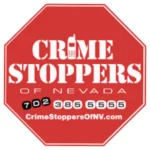Las Vegas Visitor Safety Tips

Ensuring Your Safety in Las Vegas
Generally a safe destination for tourists, Las Vegas requires staying vigilant and following safety guidelines to ensure a pleasant visit. Here are safety tips to help you enjoy your time in Las Vegas without any worries.
Basic Safety Tips
Security and police presence are higher in tourist areas like the Las Vegas Strip and downtown’s Fremont Street Experience. However, safety hazards still exist. Follow these tips to stay safe.
- Choose Safe Places to Stay: Pick well-known hotels or resorts with good reviews.
Stay in Tourist-Centered Places: Keep within the tourist areas and avoid the neighborhoods surrounding them, as some can be dangerous.
Avoid Walking Alone at Night: Travel with someone, use taxis or rideshare services. If walking alone, stay in well-lit and crowded areas.
Keep Your Belongings Safe: Keep valuables close and out of plain sight. Use a secure bag, and never leave your things unattended. Avoid wearing expensive jewelry or carrying large amounts of cash.
Be Careful with Personal Information: Use trusted ATMs, and don’t share sensitive info with strangers.
Use Secure Transportation: Avoid walking long distances, especially at night. For safer travel, use taxi cabs, rideshares, or public transportation.
Practice Car Safety: Remove all items and valuables from inside your vehicle, park in well-lit areas, and check your surroundings.
Beverage Safety: Accept drinks only from bartenders or wait staff, and never leave your drink unattended.
Emergency Contacts and Services
In an emergency, call 911 for help. Know the nearest hospital or urgent care center to your location. Many hotels have security and medical staff available.
For non-emergencies, call or visit online:
- Las Vegas Metro Police (non-emergency): (702) 795-3111
- Henderson Police (non-emergency): (702) 267-5000
- North Las Vegas Police (non-emergency): (702) 633-9111
Health and Medical Services
Las Vegas has hospitals and urgent care centers for visitors. University Medical Center and Sunrise Hospital can handle emergencies. Bring any necessary medical supplies and prescription medications.
Watch Out for Tourist Scams in Las Vegas
Like any large tourist destination, there are scams in Las Vegas. Be mindful of buskers looking for donations, individuals you do not know who might offer you tickets to a free show, and too-friendly strangers. Be sure to validate offers and never give out personal information to people you do not know.
Common Scams
You’ll see plenty of street performers and costumed characters on the Strip. They often invite tourists to take photos with them. However, after the photo is taken, they demand a hefty tip. While tipping is customary, some may pressure you for more money than expected.
Timeshare representatives often lure tourists with free gifts, show tickets, or meals in exchange for attending a presentation. While these offers are most likely real, the presentations can be high-pressure and lengthy, often lasting several hours. The goal of these presentations is to sell you a timeshare. The sales tactics can be very aggressive, and the deals often aren’t as good as they seem. Always research before committing to any purchase.
Some taxi drivers may take longer routes to increase the fare, a practice known as long-hauling. To avoid this, research the best route to your destination beforehand or use a rideshare app that shows the route.
Rideshare services like Uber and Lyft use surge pricing during peak times. Be aware that prices can skyrocket during these times, and always check the fare estimate before confirming a ride.
Scalpers may sell fake or overpriced tickets for shows and events. Always buy tickets from reputable sources or directly from the venue to avoid counterfeit tickets.
Some operators offer tours at a bargain price but deliver subpar experiences or no tour at all. Verify the legitimacy of tour operators through reviews and official tourism websites.
Street gambling games like Three-Card Monte are designed to scam participants. The game is rigged, and you’re almost guaranteed to lose. Avoid participating in any street gambling activities.
Skimming Devices: Be cautious when using ATMs, as some may have skimming devices that steal your card information. Use ATMs located inside banks or well-lit, secure areas.
Fake ATMs: Fake ATMs can be set up to capture your card details and PIN. Stick to ATMs affiliated with major banks to avoid this risk.
Scammers may call your hotel room pretending to be the front desk and ask for your credit card details. Always visit the front desk in person to resolve any issues, or simply hang up and call them back from your hotel room’s phone.
Busy areas like the Strip and Fremont Street are prime spots for pickpockets. So are gathering areas such as the Conservatory at the Bellagio or any place that draws a crowd. Keep your valuables secure and be aware of your surroundings. Pickpockets often use distraction techniques, such as bumping into you or causing a commotion. Stay alert and keep your belongings close.
Drink spiking can occur in bars and nightclubs. Never leave your drink unattended, and avoid accepting drinks from strangers. Use the buddy system when going out at night. Keep an eye on each other’s drinks and stick together.
Scammers may pose as charity workers and solicit donations on the street. Verify the legitimacy of any charity before donating. Here is a little hint: the monks aren’t real.
Stick to licensed taxis and confirmed ride-sharing rides. Avoid unmarked vehicles or individuals who approach you on the street to offer transportation.
Limit purchases of items such as bottled water, jewelry, gift cards, and other items sold on the street and pedestrian walkways around the casinos. Items are generally cheap or fake, and potentially unsafe to consume. Stick to licensed shops and avoid buying from rouge street vendors.
A “trick-roll” scam in Las Vegas is a type of confidence trick where a prostitute or escort, sometimes working alone or with accomplices, steals money or valuables from a client. Here’s how it typically works:
Targeting: The scammer targets a potential victim, often a male tourist or someone perceived as wealthy or vulnerable, typically in casinos, bars, or nightclubs.
Initial Approach: The scammer engages the victim in conversation, offering companionship or sexual services for a fee.
Going to a Private Location: The victim is persuaded to go to a hotel room or another private location with the scammer.
Theft: Once in a private setting, the scammer finds an opportunity to steal from the victim. This could involve various tactics such as:
- Distracting the victim and taking their wallet, watch, or other valuables.
- Drugging the victim’s drink to incapacitate them and then robbing them.
- Having an accomplice enter the room to assist in the theft.
Escape: After the theft, the scammer quickly leaves the scene, often before the victim realizes what has happened.
Victims of trick-roll scams often feel embarrassed and may be reluctant to report the crime, which can make it difficult for law enforcement to track down and apprehend the perpetrators. The term “trick-roll” refers to the combination of being “tricked” and having one’s money or possessions “rolled” (stolen).
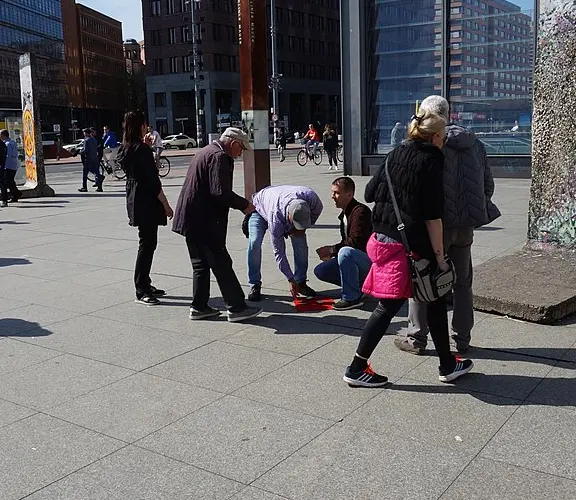
Identifying Local Police and Security Staff
In Las Vegas, recognizing the unique uniform details allows visitors to identify and understand the roles of different LVMPD officers easily. These officers utilize various patrol methods, such as foot patrols, car patrols, bicycle patrols, motorcycle patrols, and equestrian patrols, each performing different responsibilities within the department.
The are Four Styles of Las Vegas Police Officer Uniforms:
1. Yellow Uniform (Traffic Officers)
- Shirt: Bright yellow, short-sleeve, or long-sleeve, with reflective strips for high visibility.
- Pants/Shorts: Black, matching the shirt’s style. Traffic officers often wear shorts in hot weather.
- Shoes: Black tactical boots.
- Hat: Black baseball cap with the LVMPD badge or insignia.
- Helmet: White motorcycle helmets with black visors when on duty on motorcycles.
- Belt: Black duty belt with standard police equipment, including a firearm, handcuffs, radio, baton, and pepper spray.
- Badge: Silver-colored, prominently displayed on the left chest.
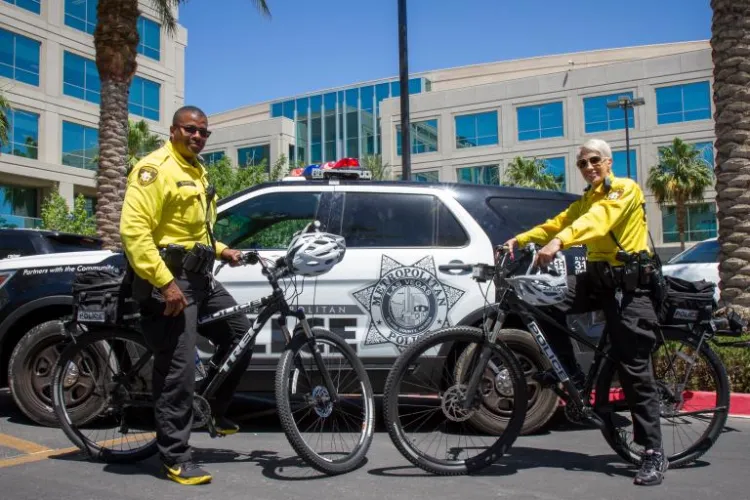
2. Brown Uniform (Corrections Officers)
- Shirt: Dark brown, typically short-sleeve, with a badge on the left chest.
- Pants: Dark brown, matching the shirt.
- Shoes: Black tactical boots.
- Hat: Usually not worn indoors, but outdoors, a dark brown cap or hat with the LVMPD insignia.
- Belt: Black duty belt with equipment similar to other officers, focused on corrections-related tools.
- Badge: Silver-colored, displayed on the left chest.
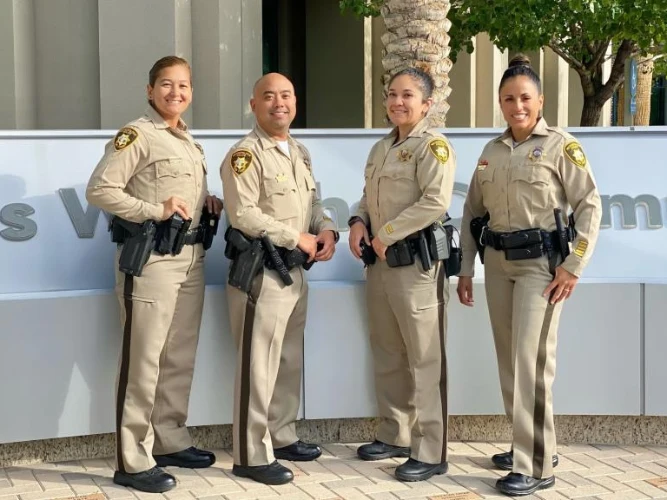
3. Tan Uniform (Patrol Officers)
- Shirt: Light tan, short-sleeve, or long-sleeve, with LVMPD patches on both shoulders.
- Pants: Dark green or brown, matching the shirt in style and material.
- Shoes: Black tactical boots.
- Hat: Tan or dark green baseball cap or a more formal hat with the LVMPD insignia.
- Belt: Black duty belt with standard police equipment, including a firearm, handcuffs, radio, baton, and pepper spray.
- Badge: Silver-colored, displayed on the left chest.
- Adornments: Officers may also wear rank insignia and service ribbons above the badge.
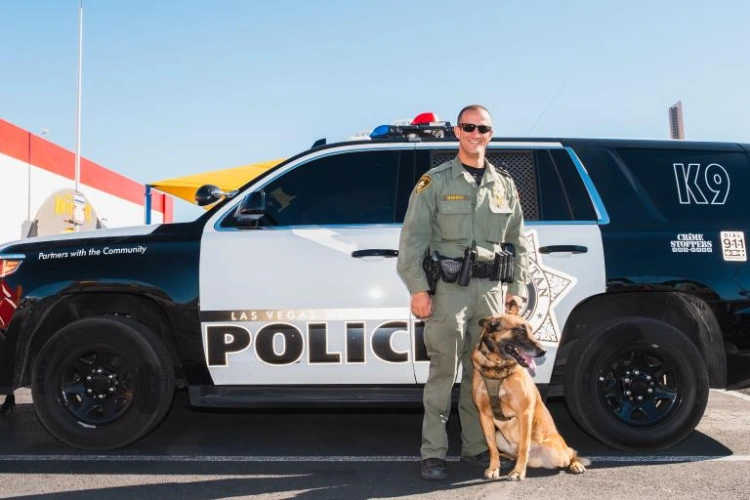
4. Volunteer Uniform
- Shirt: Typically white or another light color, short-sleeve with “Volunteer” and the LVMPD logo printed.
- Pants: Black or dark blue, less formal than full-time officers.
- Shoes: Comfortable black shoes or tactical boots.
- Hat: White or matching the shirt, with “Volunteer” and the LVMPD logo.
- Belt: Simple black belt, not as heavily equipped as full-time officers.
- Badge/Adornments: Volunteers do not carry the same badges as sworn officers but may have an ID badge or tag indicating their role.
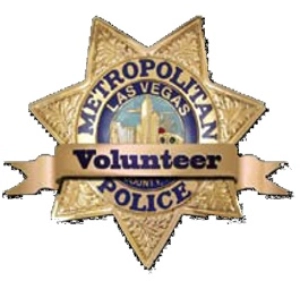
Potentially Dangerous Areas
Las Vegas is mostly safe, but some areas have higher crime rates. Stay in well-lit places like the Las Vegas Strip and downtown. Avoid flood-control tunnels and research neighborhoods to avoid gang activity. Tourists should avoid locations near UNLV, around the Stratosphere, and west of the Strip, including East Fremont Street beyond downtown, Naked City, parts of North and West Las Vegas, Industrial Road, Boulder Highway, Carey Avenue, and Twain Avenue.
Stay Away from Flood-Control Tunnels
Las Vegas has flood-control tunnels under the city. While they manage water during heavy rains, entering them is dangerous.
The tunnels are dark, filled with sharp debris and drug needles, they can flood quickly and are structurally unsound in places
A population of homeless people live here, which can lead to dangerous encounters.
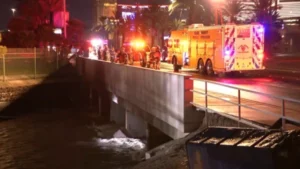
See Something Say Something
Crime Stoppers of Nevada
Crime Stoppers is a community-based organization that fosters a safer environment by empowering citizens to report information about criminal activities anonymously.
To report a crime or provide an anonymous tip about one, contact them at (702) 385-5555 or visit crimestoppersofnv.com.
Tourist Safety in Las Vegas FAQs
Use taxi cabs, ride-shares, or the city bus system for safer travel, especially at night. Avoid walking long distances alone. If you drive, park in well-lit areas and check your surroundings before getting into your vehicle.
Report any suspicious activity to hotel security or dial 911 if it’s an emergency. For non-emergencies, contact Las Vegas Metro Police at (702) 795-3111, Henderson Police at (702) 267-5000, or North Las Vegas Police at (702) 633-9111.
Be Mindful of Personal Items: Theft and pickpocketing are common. Keep your bags close, avoid displaying expensive jewelry, and avoid carrying large amounts of cash.
To stay safe from spiked drinks in Las Vegas, only accept them from bartenders or wait staff, never leave your drink unattended, watch your drink being made, and be mindful of accepting drinks from strangers. Utilize the buddy system to keep an eye on each other’s drinks.
Avoid engaging with strangers offering companionship or sexual services, especially in casinos, bars, or nightclubs. If you decide to go to a private location, ensure you keep your belongings secure and remain cautious of your surroundings. It’s safer to avoid these situations altogether to reduce the risk of theft.
Avoid sharing personal or financial information with unknown individuals or unverified websites. Use secure ATMs located inside banks or well-lit areas, and be cautious when using public Wi-Fi networks. Use credit cards over debit cards for added security against fraud.
Always purchase tickets from reputable sources, such as official venue box offices or trusted online platforms. Avoid buying tickets from scalpers or unofficial sellers, as these are often counterfeit or overpriced.
Politely decline and leave the presentation if you feel uncomfortable. You are under no obligation to stay or purchase anything. Research and consider your options carefully before committing to any timeshare deals.
Use ATMs located inside banks or well-lit, busy areas. Avoid using standalone ATMs or those in secluded locations. Check for skimming devices and cover your PIN when entering it. Use credit cards over debit cards for added protection against fraud.
Public transportation, such as the city bus system, is generally safe. However, be aware of your surroundings and avoid isolated bus stops, especially at night. Keep your belongings secure and sit near the driver or in well-populated areas of the bus.
Look for unusual attachments or loose parts around the card slot. Cover your hand when entering your PIN and use ATMs inside banks or well-lit areas. Avoid using ATMs in isolated or poorly lit locations.
Vital Visitor Safety Related Links:
- Las Vegas Crime Statistics
- Henderson Crime Statistics
- North Las Vegas Crime Statistics
- United States Crime Statistics
- Las Vegas Metropolitan Police Department
- LVMPD Crime Statistics & Transparency
- North Las Vegas Police Department
- Henderson Police Department
- Boulder City Police Department
- Mesquite Police Department
- Nye County Sheriff
- Nevada Department of Safety
- NV DOJ – Office of the Attorney General
- U.S. Department of Justice
- Nevada Homeland Security
- Federal Bureau of Investigation
